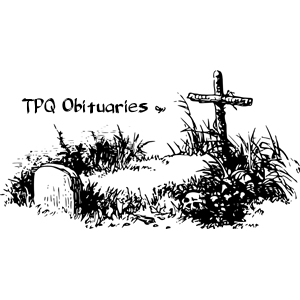 |
| Liz King |
Liz King who died in October of last year was one of two stalwarts from the Millmount Tower complex to have sadly joined the ranks of the departed, faithful or not. The other, Sean Corcoran, died earlier this year.
It was through Sean that I first met Liz. He was President of the Old Drogheda Society and through its auspices gave me a start in Local Voices, the office of which was situated in the somewhat fortress-resembling Millmount Museum. The entire time I was there, for two years Liz sat across the room from me studiously researching and archiving.
Initially reserved, she soon got used to yet another stranger in her abode and we would often chew the fat. Liz with her numerous contacts, not only knew the history of Drogheda but also had a keen awareness of the various schisms and agendas that had come to leave their welt on groups in the Drogheda community sector, both voluntary and funded. There, the disputes tended to be more boring than vicious because they were about so little, to rework a phrase from a well-known American scoundrel.
Liz was having no part in any of it, often rolling her eyes and sauntering on when the latest tittle-tattle came up. She sketched out enough of the background for me so that if I became immersed in the intrigue I would have only myself to blame. If she led by example, the trail she blazed was one of the solitary loner, taking no gyp and giving none. Liz kept herself to herself but was out of her chair in a flash to respond to any one of my endless queries.
She would arrange interviews for me and would always work out in advance what buttons not to press with a particular interviewee. Local history, drawing on oral history techniques, can frequently be a minefield laden with the tripwires of vanity. She was a skilled circumnavigator who would ultimately reach the port of her choice. She was part of the team that gave logistical support to Helena Byrne’s prestigious Abbey Ballroom Indoor Football League project which blew away the dust that had settled on a topic not well covered, and brought male and female soccer voices to the fore.
For myself, however, our most productive collaboration came after my time in Local Voices had expired via the publication of the book, Reflections On The 1916 Rising. As editor, I worked with Liz who served on the editorial team which would meet and liaise frequently in order to meet the publication date.
2014 was a difficult year. The PSNI were tripping over tangible, jutting evidence of serious torture of hooded men in the opening days of Britain’s Operation Demetrius in 1971 but preferred to fall flat on their porcine faces rather than admit to the real cause of their trip. It was not quite what Harold Macmillan had said, but evidence dear boy, evidence … and there were mountains of it.
At the same time the PSNI in time honoured partisan fashion were haring off in pursuit of evidence that was ultimately rejected in court. Gerry Adams was arrested on suspicion of abducting, killing and disappearing Jean McConville. The atmosphere was thick with gossip and speculation. I would sit at my desk while the radio news reported what at times seemed like daily arrests linked to the Boston College tapes. People I had neither heard of, spoken to nor met were amongst those being scooped. While others pored over the headlines, seeing in myself an object of curiosity, it mattered nothing to Liz. She just carried on as if the news reader had been talking about snow drifts in Outer Mongolia.
We gelled and it was a kinship cemented by our shared love of reading. When we were not working we could talk literature for hours. Often, I would tell her I was bored sitting at the desk and was going to browse the bookshops in town. Invariably she would ask me to look out for something she wanted to read. Then, she had a like for the biographies or autobiographies of musicians and sportspeople. Two of the books I brought down for her were on Kate Bush and one of the tennis playing Williams sisters. Another that spiked her curiosity was the Adam Feinstein biography of Pablo Neruda, the Chilean poet murdered in 1973 by the Pinochet regime.
Initially reserved, she soon got used to yet another stranger in her abode and we would often chew the fat. Liz with her numerous contacts, not only knew the history of Drogheda but also had a keen awareness of the various schisms and agendas that had come to leave their welt on groups in the Drogheda community sector, both voluntary and funded. There, the disputes tended to be more boring than vicious because they were about so little, to rework a phrase from a well-known American scoundrel.
Liz was having no part in any of it, often rolling her eyes and sauntering on when the latest tittle-tattle came up. She sketched out enough of the background for me so that if I became immersed in the intrigue I would have only myself to blame. If she led by example, the trail she blazed was one of the solitary loner, taking no gyp and giving none. Liz kept herself to herself but was out of her chair in a flash to respond to any one of my endless queries.
She would arrange interviews for me and would always work out in advance what buttons not to press with a particular interviewee. Local history, drawing on oral history techniques, can frequently be a minefield laden with the tripwires of vanity. She was a skilled circumnavigator who would ultimately reach the port of her choice. She was part of the team that gave logistical support to Helena Byrne’s prestigious Abbey Ballroom Indoor Football League project which blew away the dust that had settled on a topic not well covered, and brought male and female soccer voices to the fore.
For myself, however, our most productive collaboration came after my time in Local Voices had expired via the publication of the book, Reflections On The 1916 Rising. As editor, I worked with Liz who served on the editorial team which would meet and liaise frequently in order to meet the publication date.
2014 was a difficult year. The PSNI were tripping over tangible, jutting evidence of serious torture of hooded men in the opening days of Britain’s Operation Demetrius in 1971 but preferred to fall flat on their porcine faces rather than admit to the real cause of their trip. It was not quite what Harold Macmillan had said, but evidence dear boy, evidence … and there were mountains of it.
At the same time the PSNI in time honoured partisan fashion were haring off in pursuit of evidence that was ultimately rejected in court. Gerry Adams was arrested on suspicion of abducting, killing and disappearing Jean McConville. The atmosphere was thick with gossip and speculation. I would sit at my desk while the radio news reported what at times seemed like daily arrests linked to the Boston College tapes. People I had neither heard of, spoken to nor met were amongst those being scooped. While others pored over the headlines, seeing in myself an object of curiosity, it mattered nothing to Liz. She just carried on as if the news reader had been talking about snow drifts in Outer Mongolia.
We gelled and it was a kinship cemented by our shared love of reading. When we were not working we could talk literature for hours. Often, I would tell her I was bored sitting at the desk and was going to browse the bookshops in town. Invariably she would ask me to look out for something she wanted to read. Then, she had a like for the biographies or autobiographies of musicians and sportspeople. Two of the books I brought down for her were on Kate Bush and one of the tennis playing Williams sisters. Another that spiked her curiosity was the Adam Feinstein biography of Pablo Neruda, the Chilean poet murdered in 1973 by the Pinochet regime.
Once I moved on from Local Voices and Reflections, I would still see Liz as I had to consult her from time to time about pieces I had commissioned while editor of the Journal of The Old Drogheda Society. Often in town we would stop for a quick chat, even if it amounted to no more than meanwhile back at the farm. The last time I met her we were both coming out of Tesco Extra. I think there was a problem with her phone so I called her a taxi. She offered me a lift home but I was out for the walk so politely declined.
A mother, grandmother and community historian, Liz made a significant contribution to the cultural life of Drogheda town.






She sounds a very possitive woman Anthony. Confident in thought and deed.
ReplyDeleteCaoimhin O'Muraile
Liz made an impact Caoimhin. I like to remember her for it. When I see my name alongside hers in relation to the projects we helped develop, I feel a sense of pride.
Delete